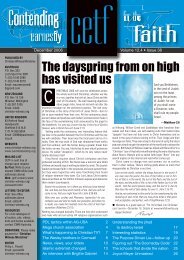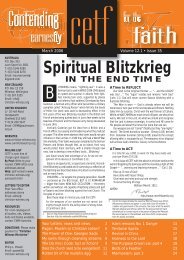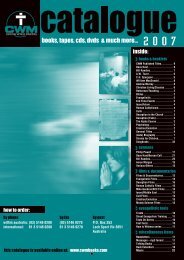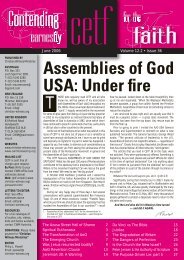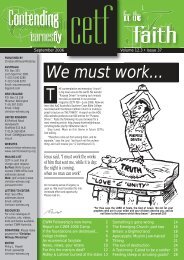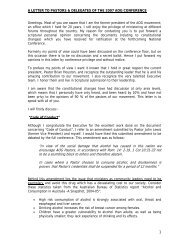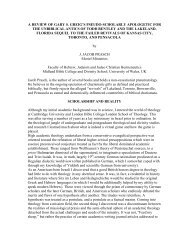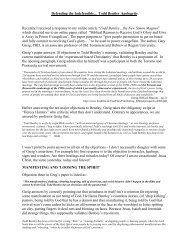PDF here... - Christian-witness.org
PDF here... - Christian-witness.org
PDF here... - Christian-witness.org
- No tags were found...
Create successful ePaper yourself
Turn your PDF publications into a flip-book with our unique Google optimized e-Paper software.
W E A R E N O T A S M A N Y W H O P E D D L E T H E W O R D O F G O D • 2 C o r i n t h i a n s 2 : 1 7The Still Small VoiceBy B. MICHAEL BIGGOF incredible value to the <strong>Christian</strong> isJ.C. Ryle’s 1 masterful work, “Holiness” 2 ,and the abridged edition, “Aspects ofHoliness” 3 . In the chapter “Want of theTimes”, Ryle makes the statement,Oh, that people would remember that it wasnot the wind, or the fire, or the earthquake,which showed Elijah the presence of God, but‘the still small voice’ (1 Kings 19:12). 4And though Ryle and others are right to emphasisethe personal relationship of <strong>Christian</strong>s with God,and use Elijah’s encounter at Mount Horeb to homein on aspects of such a relationship, we must beaware of the background to Elijah’s experience tofully understand the encounter. Furthermore, wemust be aware of the modern abuse of referencingthis scripture to justify an experience. It wasbecause of God’s presence that the experiencehas meaning, and not because Elijah experienceda “still small voice” that God was present. Maywe look to God rather than an experience, for it iswhen we encounter God that the experience willbe of value.The Mountain of GodAfter Israel left Egypt and made their way toMount Sinai, Moses ascended the mountain to Godand God told Moses His intention to enter into acovenant with Israel. On the day that this was tooccur God descended upon the mountain,So it came about on the third day, when itwas morning, that t<strong>here</strong> were thunder andlightning flashes and a thick cloud uponthe mountain and a very loud trumpetsound, so that all the people who were inthe camp trembled. And Moses brought thepeople out of the camp to meet God, and theystood at the foot of the mountain. Now MountSinai was all in smoke because the LORDdescended upon it in fire; and its smokeascended like the smoke of a furnace, andthe whole mountain quaked violently. Whenthe sound of the trumpet grew louder andlouder, Moses spoke and God answered himwith thunder. The LORD came down on MountSinai, to the top of the mountain; and the LORDcalled Moses to the top of the mountain, andMoses went up (Exodus19:16–20) 5Exodus also records the reaction of the people,1 J.C. Ryle, 1816-1900. First Anglican Bishop of Liverpool(1880-1900).2 J.C. Ryle, Holiness: its nature, hindrances, difficulties,and roots, (Darlington, England: Evangelical Press, 1979).3 J.C. Ryle, Aspects of Holiness (London: GracePublications Trust, 1999).4 J.C. Ryle, Holiness: its nature, hindrances, difficulties,and roots, (Darlington, England: Evangelical Press, 1979),295.5 Unless otherwise stated, verses are from the NewAmerican Standard, Updated (1995).20All the people perceived the thunder andthe lightning flashes and the sound of thetrumpet and the mountain smoking; andwhen the people saw it, they trembled andstood at a distance. Then they said to Moses,“Speak to us yourself and we will listen; butdon’t let God speak to us, or we will die.” Mosessaid to the people, “Do not be afraid; for God hascome in order to test you, and in order that thefear of Him may remain with you, so that youmay not sin.” So the people stood at a distance,while Moses approached the thick cloud w<strong>here</strong>God was (Exodus 20:18–21).Both the Old and New Testaments 6 , record not justthat God entered into covenant with Israel and thegiving of the Law (the Ten Commandments and theordinances that followed), but the experience of itby the parties present. God’s presence brought athick cloud upon the mountain with lightning andthunder, but also the sound of a trumpet. But it wasno ordinary trumpet. When a trumpet sounds themusician holds the note, or sound, as long as hecan before the air in his lungs is fully exhaled andthe volume of the trumpet dies away. In contrast,the trumpet on the mountain did not become softer,but “grew louder and louder”. In the days prior tosynthesised digital effects this indeed would bean uncommon, unusual and unnatural event in itsown right; but this was but one of five 7 supernaturalevents at the giving of the law.Horeb, the mountain of God at Sinai, was notjust the location w<strong>here</strong> God entered into covenantwith Israel, it was The Mountain of God, w<strong>here</strong> Godrevealed Himself.Enter ElijahApproximately 800 years after entering intoCovenant with God, Israel, in her usual example ofthe sinfulness of man 8 , was still rebellious againstGod. And just as Israel whined against God andMoses in the wilderness so too did they whine andrebel in Elijah’s day. In 1 Kings 18 Elijah confronted6 Hebrews 12:18-20. “For you have not come to amountain that can be touched and to a blazing fire, andto darkness and gloom and whirlwind, and to the blastof a trumpet and the sound of words which sound wassuch that those who heard begged that no further wordbe spoken to them. For they could not bear the command,‘If even a beast touches the mountain, it will be stoned.’”7 Thunder, lightning, cloud, trumpet and earthquake.8 In reading the Old and New Testaments one may questionGod’s choice of Israel as a chosen people. But God in Hiswisdom chose wisely; for Israel truly represents the flawedcharacter in all of us: sinful, corrupt, unfaithful and full ofpride. That Israel, the keepers of the Old Testament oraclesof God, rejected the Messiah, Jesus, at His first coming isone thing; but that the “<strong>Christian</strong>” West (i.e. nations of<strong>Christian</strong> heritage, though it is more true to say they aresecular these days, that these nations), in general, rejectJesus Christ—having available to her both Old and NewTestaments—shows that we, indeed, are no better, butrather worse.Ahab, king of the northern kingdom of Israel 9 .Elijah said, “As the LORD of hosts lives, beforewhom I stand, I will surely show myself to himtoday.” So Obadiah went to meet Ahab and toldhim; and Ahab went to meet Elijah. When Ahabsaw Elijah, Ahab said to him, “Is this you, youtroubler of Israel?” He said, “I have not troubledIsrael, but you and your father’s house have,because you have forsaken the commandmentsof the LORD and you have followed the Baals.Now then send and gather to me all Israel atMount Carmel, together with 450 prophets ofBaal and 400 prophets of the Asherah, who eatat Jezebel’s table.” So Ahab sent a messageamong all the sons of Israel and brought theprophets together at Mount Carmel (1 Kings18:15–20).In confronting the people Elijah asked, “‘How longwill you hesitate between two opinions? If theLORD (Yahweh) is God (Elohim), follow Him; but ifBaal, follow him.’ But the people did not answerhim a word” (1 Kings 18:21). As ‘fence-sitters’the people would not advocate one point of viewor the other, but rather went with the status quo.Only after God’s sovereign display of His powerwould the people acknowledge, in an urgent doubleimperative, that “Yahweh is God (Elohim), Yahwehis God (Elohim)” (v39).Despite the obvious success on MountCarmel, of which all of Israel and King Ahab wereeye<strong>witness</strong>es, Elijah, following Queen Jezebel’sthreat to have him executed, ran for his life. It is<strong>here</strong>, after having prayerfully sought God to answerby fire on Mount Carmel, that we encounter Elijah,the ‘prophet of fire’ 10 .Having escaped from Jezebel and having madehis way past Beersheba, in the southern kingdomof Judah, Elijah entreated God to end his life (1Kings 19:4). God, however, sent to Elijah the Angelof the LORD to provide food and water. Twice theangel visited and twice Elijah ate. On the strengthof these two meals Elijah travelled to Horeb, theMountain of God. 119 Following the death of King Solomon the Kingdomof Israel was divided into the Southern Kingdom ofJudah (comprised of the tribes of Judah and Benjamin)and the Northern Kingdom of Israel (comprised of theother tribes). The Northern Kingdom survived until theinvasion of the Assyrians, and the Southern Kingdomuntil invasion of the Babylonians. For seventy years theSouthern Kingdom was in exile, until the decree wentforth for Israel to return. Upon their return, Judah, asthe Southern Kingdom was called, became the name forIsrael’s inhabitants in “Judea”.10 See also, 2 Kings 1:9-15.11 Rick Warren, in the introduction to his book, ThePurpose Driven Life, ridiculously claims that “Elijah wastransformed when God gave him 40 days of strengthfrom a single meal.” It was not the meal that transformedElijah, but Elijah’s encounter with God at Mount Horeb;let alone that it was two meals and not one as RickWarren asserts.



